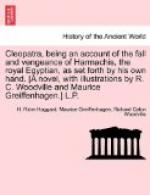“This then is our plot, royal Cousin. Thou must gain an entrance to the Household and learn its ways and secrets, and, so far as may be, suborn the eunuchs and captains, some of whom I have already tempted. This done, and all things being prepared without, thou must slay Cleopatra, and, aided by me with those whom I control, in the confusion that shall ensue, throw wide the gates, and, admitting those of our party who are in waiting, put such of the troops as remain faithful to the sword and seize the Bruchium. Which being finished, within two days thou shalt hold this fickle Alexandria. At the same time those who are sworn to thee in every city of Egypt shall rise in arms, and in ten days from the death of Cleopatra thou shalt indeed be Pharaoh. This is the counsel which has been taken, and thou seest, royal Cousin, that, though our uncle yonder thinks so ill of me, I have learned my part—ay, and played it.”
“I hear thee, Cousin,” I answered, marvelling that so young a woman—she had but twenty years—could weave so bold a plot, for in its origin the scheme was hers. But in those days I little knew Charmion. “Go on; how then shall I gain entrance to the palace of Cleopatra?”
“Nay, Cousin, as things are it is easy. Thus: Cleopatra loves to look upon a man, and—give me pardon—thy face and form are fair. To-day she noted them, and twice she said she would she had asked where that astrologer might be found, for she held that an astrologer who could wellnigh slay a Nubian gladiator with his bare hands, must indeed be a master of the fortunate stars. I answered her that I would cause inquiry to be made. So hearken, royal Harmachis. At midday Cleopatra sleeps in her inner hall which looks over the gardens to the harbour. At that hour to-morrow, then, I will meet thee at the gates of the palace, whither thou shalt come boldly asking for the Lady Charmion. I will make appointment for thee with Cleopatra, so that she shall see thee alone when she wakes, and the rest shall be for thee, Harmachis. For much she loves to play with the mysteries of magic, and I have known her stand whole nights watching the stars and making a pretence to read them. And but lately she has sent away Dioscorides the physician, because, poor fool! he ventured on a prophecy from the conjunction of the stars, that Cassius would defeat Mark Antony. Thereon Cleopatra sent orders to the General Allienus, bidding him add the legions she had sent to Syria to help Antony to the army of Cassius, whose victory, forsooth, was—according to Dioscorides—written on the stars. But, as it chanced, Antony beat Cassius first and Brutus afterwards, and so Dioscorides has departed, and now he lectures on herbs in the museum for his bread, and hates the name of stars. But his place is empty, and thou shalt fill it, and then we will work in secret and in the shadow of the sceptre. Ay, we will work like the worm at the heart of a fruit, till the time of plucking comes, and at thy dagger’s touch, royal Cousin, the fabric of this Grecian throne crumbles to nothingness, and the worm that rotted it bursts his servile covering, and, in the sight of empires, spreads his royal wings o’er Egypt.”




